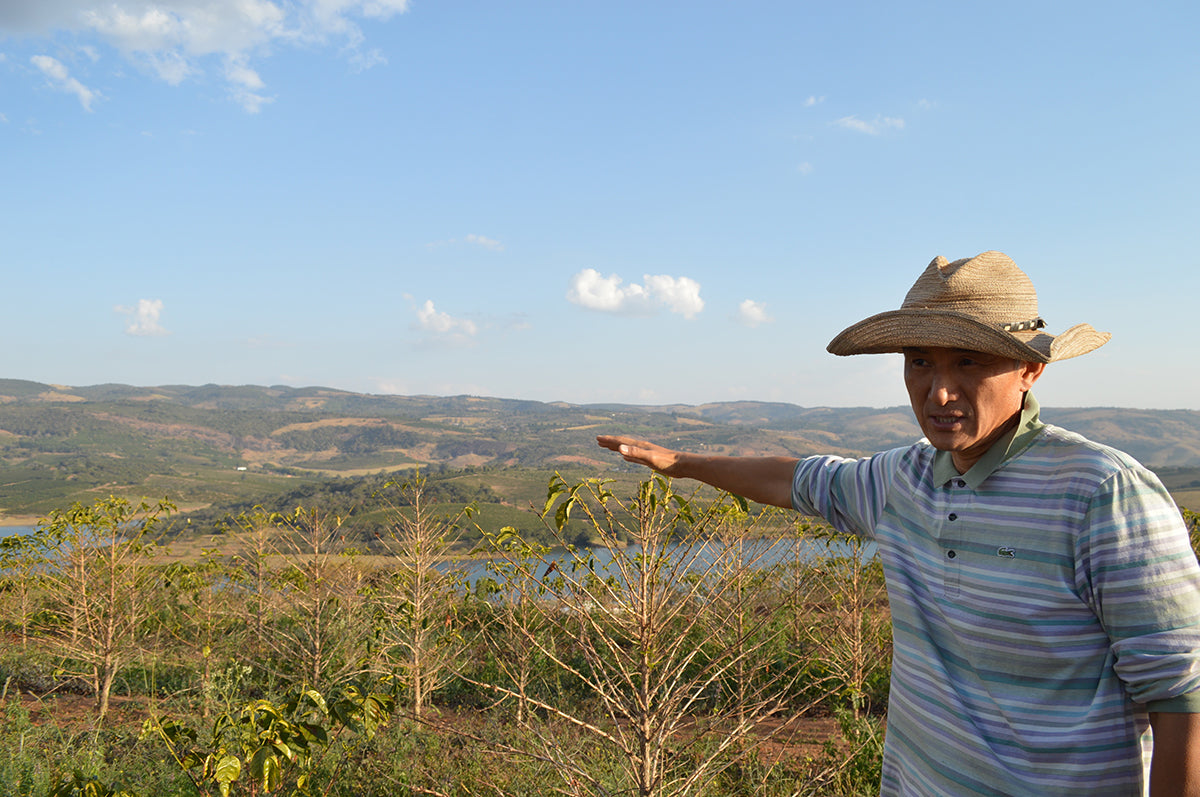UM Coffee Estate
 Whilst planning the itinerary for my recent trip to Brazil, I contacted a friend of mine, Edimilson Generoso. I first met Edmilson at the SCA (Specialty Coffee Association) event in Seattle back in 2015 and he has since visited us at Dimattina as part of the Brazilian Specialty Coffee Association team. Edmilson is extremely passionate about Brazilian coffee and has been involved in sourcing the best lots for many years; I really trust his advice, not only because he is a lovely person, but also because he is a six-time (by my count, probably more now) cup tasting champion of Brazil! Needless to say, when Edimilson offered to guide our visit to Um coffee state, I couldn’t refuse.
Whilst planning the itinerary for my recent trip to Brazil, I contacted a friend of mine, Edimilson Generoso. I first met Edmilson at the SCA (Specialty Coffee Association) event in Seattle back in 2015 and he has since visited us at Dimattina as part of the Brazilian Specialty Coffee Association team. Edmilson is extremely passionate about Brazilian coffee and has been involved in sourcing the best lots for many years; I really trust his advice, not only because he is a lovely person, but also because he is a six-time (by my count, probably more now) cup tasting champion of Brazil! Needless to say, when Edimilson offered to guide our visit to Um coffee state, I couldn’t refuse.


The estate came under new ownership and management in 2011 when Korean entrepreneur Stephano Um and his family took over. Since then, all of Fazenda Um’s coffee production has been renewed; new trees were planted with the aim of improving quality for an increasingly discerning market. With a lot of passion and investment (both in time and money), Um’s renewed coffee production intends to deliver to their clients only the highest quality Brazil specialty coffees (and I can say first-hand that they’ve got them!) Fazenda Um focuses primarily on three different varieties: Mundo Novo, Bourbon Amarelo and Catuai. Taking advantage of the history and experience of the past coffee production as well as using new methods of harvesting and processing, Fazenda Um is paving the way for a new generation of specialty coffee in Brazil.
Currently Fazenda Um are using strictly natural processing techniques, some on patios, some in raised beds and drying for around 40-60days. They are also building even higher raised beds with three layers to take advantage of their unique altitude and climate enabling the coffee to dry even slower (up to 90 days!) the idea being to slow down the drying process and achieve a more “controlled fermentation”.


During my travels, I’ve tried to analyse how committed the farmers are to sustainability and when I asked Mr Stephano whether the farm is irrigated, he explained the reasons why it is not: he believes that if he is trying to produce a sustainable top quality coffee it needs to respect the natural environment and the coffee has to “find a way to survive and get strong in the dry season”. He treats his coffee trees like grapevines and believes the trees will produce better coffee if they’re “struggling”.

Another interesting technique of Mr Stephano’s is (as you can see in the photos) he dries out the coffee on the patio in a “volcano shape”. This is yet another technique designed to effectively slow down the drying process and develop more complex flavours. During our visit I learned that the family also owns three cafes and a coffee academy with the third shop having only recently opened at Ciudad Del Leste, Paraguay. Later on my trip I was lucky enough to visit their coffee academy in Sao Paulo. The “Um Barista Academy” is operated by Goram and Boram Um, Mr Stephano’s sons. Goram has opted to focus his skills around SCA based learning and Boram is a Q-Grader. With these combined skills, the Um family definitely dominates their industry with flawless quality control across the entire coffee chain, from seed to cup, café service, and providing state-of-the-art knowledge for their students.

In 2017 their café in Sao Paulo was rated the best coffee in the city in a competition run by an influential national magazine (Veja). The place invites you to dive into the coffee production world. You can see and understand the entire process and experience their fabulous coffees in various forms and even grab organic produce, such as vegetables and coffee blossom honey, direct from their farm; a complete and unmissable experience when visiting Brazil’s biggest city!

